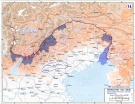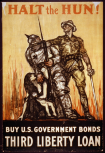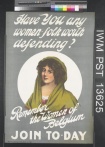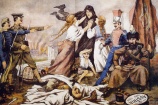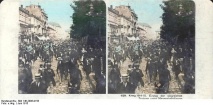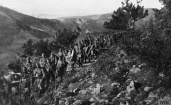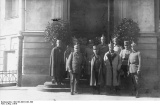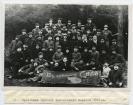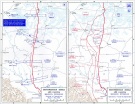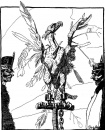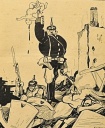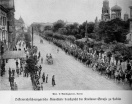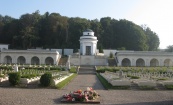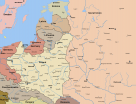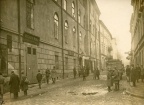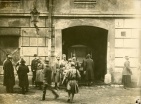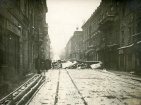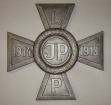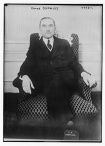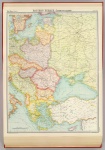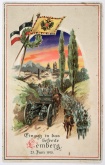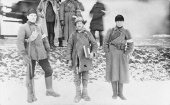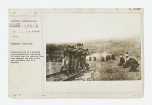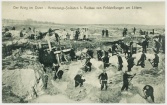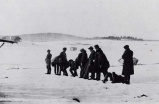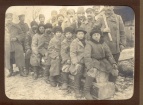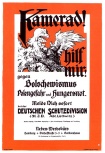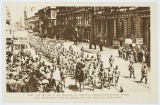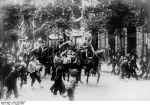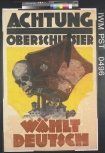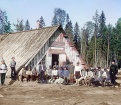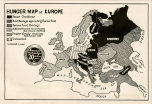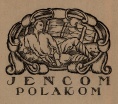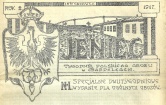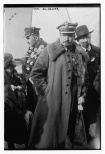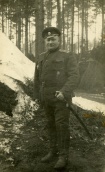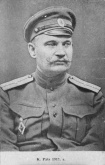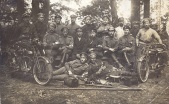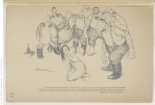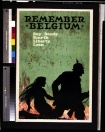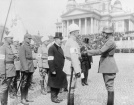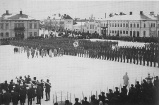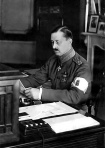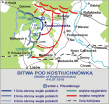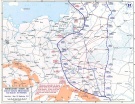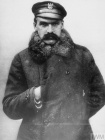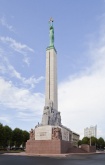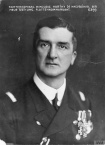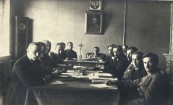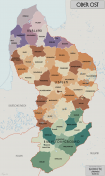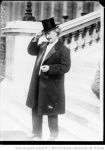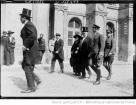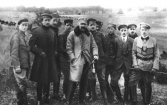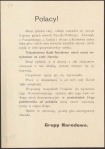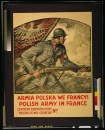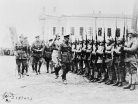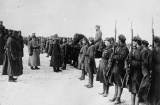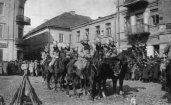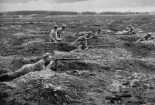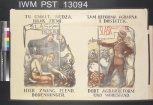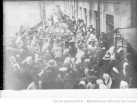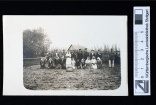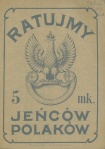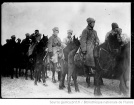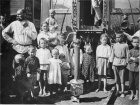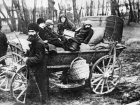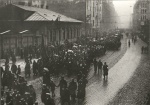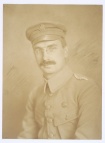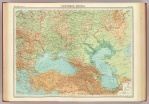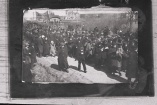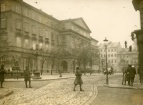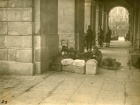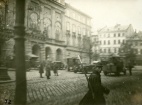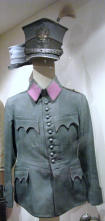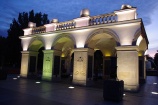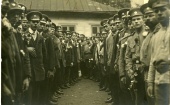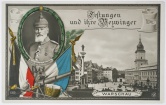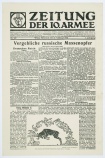Regions Poland
Survey Articles (Regional)
Regional Thematic Articles
- Centenary (Poland)
- Centenary (Poland)
- Commemoration, Cult of the Fallen (East Central Europe)
- Film/Cinema (East Central Europe)
- Food and Nutrition (East Central Europe)
- Governments, Parliaments and Parties; Political Movements and Protostate Formation (East Central Europe)
- Historiography 1918-Today (East Central Europe)
- Labour Movements and Strikes (East Central Europe)
- Occupation during and after the War (Austria-Hungary)
- Occupation during and after the War (East Central Europe)
- Polish War Myths (East Central Europe)
- Post-war Agrarian Economic Policies (East Central Europe)
- Post-war Economies (East Central Europe)
- Post-war Military Action and Violence (East Central Europe)
- Post-war Societies (East Central Europe)
- Press/Journalism (East Central Europe)
- Prisoners of War (East Central Europe)
- Propaganda at Home and Abroad (East Central Europe)
- Revolutions (East Central Europe)
- War Aims and War Aims Discussions (East Central Europe)
- Warfare 1914-1918 (East Central Europe)
Encyclopedic Entries
- Bloch, Jan Gotlib
- Bloch, Jan Gotlib
- Daszyński, Ignacy
- Dmowski, Roman
- Haller, Józef
- Kostiuchnówka, Battle of
- Lemberg
- Paderewski, Ignacy Jan
- Piłsudski, Józef
- Polish Army in France
- Polish-German Border Conflict
- Polish Legionaries Union
- Polish Legions
- Polish-Lithuanian Border Conflict
- Polish National Units in Russia
- Polish Paramilitary Organisations before 1914
- Polish-Soviet War 1920-1921
- Polish-Ukrainian Conflict over Eastern Galicia
- Rape
- Riga, Treaty of
- Tomb of the Unknown Soldier, Warsaw
- Trialism
See also
- Antisemitism
- Bereavement and Mourning
- Centenary (Historiography)
- Centenary (Museums)
- Demobilization
- Forced Labour
- Health, Disease, Mortality; Demographic Effects
- International Labour Organization
- League of Nations
- Occupation during the War
- Post-war Societies
- Propaganda at Home and Abroad
- Refugees
- Resettlement
- Social Costs of War
- The Everyday as Involved in War
- The Paris Peace Conference and its Consequences
- Veterans' Associations
- War Losses
- Women War Reporters
- Xenophobia
Survey Articles (Regional)
-
This paper presents the process of building an independent Polish state during the First World War, which, from the Polish perspective, was the most important result of this conflict. The article … READ MORE
Regional
Regional Thematic Articles
-
Contrary to the Great War, the regaining of Polish independence in 1918 has long been rooted in Polish collective memory. Its celebration has become increasingly popular since 2010. The celebration … READ MORE
Regional Thematic -
Contrary to the Great War, the regaining of Polish independence in 1918 has long been rooted in Polish collective memory. Its celebration has become increasingly popular since 2010. The celebration … READ MORE
Regional Thematic -
Commemoration, Cult of the Fallen (East Central Europe)
By Jussi Jalonen, Klaus Richter and Piotr Szlanta
In the countries of East Central Europe, the commemoration of soldiers who fell during the First World War followed a complex trajectory. After 1918, governments invested in war cemeteries and war … READ MORE
Regional Thematic -
Until 1914, cinema in the Polish lands was shaped by borders between the partitioning powers. Unlike the territories in the Prussian partition, Austrian-ruled Galicia and Russian-ruled Congress … READ MORE
Regional Thematic -
The German occupation of the north-western territories of the tsarist empire was characterized by a strong tendency to exploit local natural resources and manpower. In particular, the occupied … READ MORE
Regional Thematic -
Governments, Parliaments and Parties; Political Movements and Protostate Formation (East Central Europe)
By Klaus Richter and Piotr Szlanta
Political movements in Poland and the Baltics were heavily influenced by the German occupation, the Russian Revolution, and the political agency of their diasporas. While the establishment of an … READ MORE
Regional Thematic -
East Central European historians of the First World War have focused and continue to focus on the regaining independence and state-building processes that took place in East Central Europe in the … READ MORE
Regional Thematic -
During the First World War, revolutionary changes occurred in the labour movement in East Central Europe. The total mobilisation of resources by the warring powers and the economic crisis increased … READ MORE
Regional Thematic -
While on the Western Front there were only limited territorial movements, the Eastern Front and warfare in southeastern Europe, including parts of Italy, had all the characteristics of mobile … READ MORE
Regional Thematic -
This article examines the politics of the German (''Generalgouvernement'' Warschau) and Austro-Hungarian (''Militärgeneralgouvernement'' Lublin) occupation of the Kingdom of Poland during World War … READ MORE
Regional Thematic -
During the First World War, Józef Piłsudski and his followers invented the legend of the Riflemen Association and the First Brigade of the legions. Piłsudski, as the leader of the First Cadre … READ MORE
Regional Thematic -
Agrarianism became a major political force in the independent states that emerged from the western periphery of the Russian Empire at the end of the First World War. Politicians of agrarian parties … READ MORE
Regional Thematic -
Finland, Estonia, Latvia, Lithuania, and Poland – all countries founded after World War I on the ruins of the Russian Empire – had to face more complex challenges than most of the stable western … READ MORE
Regional Thematic -
The armistices of 1918 officially ended the First World War in Europe, but violence did not cease with the signing of the peace treaties. Fighting continued not only on the periphery, in Archangelsk … READ MORE
Regional Thematic -
Although in late 1918 countries of East Central Europe had different forms of government and military situations, they all faced similar social problems. First, the wartime ethnicization reached its … READ MORE
Regional Thematic -
The situation of the press in East Central Europe worsened after the outbreak of the First World War. There was a temporary growth in readership as a result of a desire for information. This did not, … READ MORE
Regional Thematic -
During the war, hundreds of thousands of East Central Europeans mobilised to the imperial armies of Austro-Hungary, Russia, and Germany were taken prisoner. Beyond the ordinary problems of POWs such … READ MORE
Regional Thematic -
This article discusses the content and impact of various propaganda strategies which were used in East Central Europe by warring powers, local political parties and national organizations during the … READ MORE
Regional Thematic -
This article discusses the influence the Russian Revolution had on countries in East Central Europe. In the Polish Kingdom and Lithuania there was no direct impact because of the German occupation. … READ MORE
Regional Thematic -
Already in autumn 1914, East Central Europe became a main theatre of operational warfare and an object of strategic planning for the Central Powers, Russia, and later the Entente. After strategic … READ MORE
Regional Thematic -
Unlike the war on the Western Front, warfare in East Central Europe during the First World War was characterised by comparatively rapid movements, especially in 1915 and 1917/18. This manifested … READ MORE
Regional Thematic
Encyclopedic Entries
-
Jan Bloch was an entrepreneur, social activist and pacifist. At the end of his life, he published a comprehensive work in which he predicted the course and consequences of World War I. He warned of … READ MORE
Entry -
Jan Bloch was an entrepreneur, social activist and pacifist. At the end of his life, he published a comprehensive work in which he predicted the course and consequences of World War I. He warned of … READ MORE
Entry -
Ignacy Daszyński was one of the foremost figures on the Polish political scene in the first half of the 20th century. He personified a subset of elites who merged the struggle for social … READ MORE
Entry -
Roman Stanisław Dmowski was a Polish politician and most importantly the co-founder of National Democracy in Poland before the First World War and during the interwar period. He was also the … READ MORE
Entry -
General Józef Haller was one of the best known Polish military commanders of the First World War period, a lieutenant of the Polish Legions, commander of the II Brigade of the Polish Legions, … READ MORE
Entry -
The Battle of Kostiuchnówka occurred during the Brusilov Offensive in the Volhynia region on 4–6 July 1916. It was fought between the Austro-Hungarian Corps under General Leopold Hauer’s command … READ MORE
Entry -
In World War I Lemberg (German: Lemberg, Ukrainian: Lviv, Polish: Lwów) played an important role as a political and administrative center of Galicia and was of great strategic significance as one of … READ MORE
Entry -
Ignacy Jan Paderewski was a virtuoso pianist. He made use of his popularity in the United States and western Europe to propagate the idea of Polish independence and state sovereignty. In … READ MORE
Entry -
Józef Klemens Piłsudski was a Polish statesman, socialist politician, freedom fighter, and soldier. He commanded the Polish Legions during the First World War, and served as the first chief of … READ MORE
Entry -
The Bayonne Company was the first Polish unit in France, formed in 1914 as a unit of the French Foreign Legion. The Polish Army in France was created in June 1917 and consisted of volunteers. After … READ MORE
Entry -
In the 19th century, the German-Polish borderlands became the object of nationalist designs on both sides. After 1871, the German nation-state sought to limit Polish citizens’ room for … READ MORE
Entry -
The ''Związek Legionistów Polskich'' (Polish Legionaries Union), or ZLP, was an association of veterans of Polish Legions who had fought under Józef Piłsudski for Poland’s independence during … READ MORE
Entry -
At the outbreak of the Great War, two Polish Legions were formed within the Austro-Hungarian army. They eventually increased to three brigades that participated in a series of important campaigns in … READ MORE
Entry -
The Polish-Lithuanian border conflict (1914-1924) was a consequence of the processes of modernisation and the course of the First World War. Following the creation of the states of Lithuania and … READ MORE
Entry -
The Polish Army was born out of the chaos of revolutionary Russia. The Russian authorities accepted its establishment, and later the army sought an agreement with the occupying Germans. Polish units … READ MORE
Entry -
Polish paramilitary organizations were active in Galicia from 1910 to 1914 with the permission of the Austro-Hungarian army’s intelligence service. Their ostensible aim was to militarily train … READ MORE
Entry -
The hostilities between Bolshevik Russia and Poland started as early as 1919. In April 1920, Poland and Ukraine liberated Kiev from Bolshevik control. However, in the summer of 1919, the Bolsheviks … READ MORE
Entry -
The Polish-Ukrainian conflict over Eastern Galicia in 1918-19 refers to an armed conflict between Poland and the West Ukrainian National Republic (''Zakhidnoukrayins’ka Narodna Respublika,'' ZUNR). … READ MORE
Entry -
Although rape was not usually systematic, it occurred frequently on all fronts during the First World War, during both invasion and occupation periods. It was often used in propaganda to discredit … READ MORE
Entry -
The Treaty of Riga was signed by Poland and the Soviet state on 18 March 1921 and was preceded by a preliminary treaty of 12 October 1920. It ended the Polish-Soviet War of 1919-1920 and was a … READ MORE
Entry -
The Tomb of the Unknown Soldier in Warsaw was originally built to honor the fallen Polish soldiers of the wars from 1914 to 1921. After the First World War the Cult of the Unknown Soldier … READ MORE
Entry -
Before and at the beginning of World War I, various proposals concerning the creation of a third part of the Austro-Hungarian Monarchy were brought up for discussion. Each of the aspiring groups … READ MORE
Entry
See also
-
The First World War and its direct repercussions in the postwar period (revolution, counterrevolution, the founding of republics, and the Paris peace treaties) mark a profound caesura not only in the … READ MORE
Thematic -
In the modern era, new forms of mourning and meaning-making for fallen soldiers emerged. The human losses of the First World War were largely mourned, honoured and remembered within … READ MORE
Thematic -
Innovative historical scholarship played an important role in the shaping of memory during the centenary of the First World War. It guided international public memory, was part of it and as such … READ MORE
Thematic -
This article discusses how European museums – in particular, national war museums – dealt with the centenary of World War I. These museums still tend to tell the story of World War I from a … READ MORE
Thematic -
The end of fighting in 1918 raised hopes for swift and equitable military demobilization amongst soldiers and civilians. The timing and nature of demobilization varied greatly, though, due to … READ MORE
Thematic -
This article examines the conditions, forms and consequences of forced labor and recruitment during the First World War, especially in German-occupied northern France, Belgium, Russian-Poland and … READ MORE
Thematic -
The rapid spread of epidemics ravaged military personnel and civilians in and outside Europe’s warzones during the Great War. Further, the great influenza pandemic of 1918-1919 became a global … READ MORE
Thematic -
The Treaty of Versailles was signed on 28 June 1919, establishing both the League of Nations and another international organization: the International Labour Organization (ILO). The ILO was founded … READ MORE
Thematic -
After an initial wave of interest in 1914 and the immediate post-war period, international historiography long neglected the wartime occupation of territories inhabited by large civilian populations. … READ MORE
Thematic -
The First World War caused unprecedented disruption to societies across the globe, from Western and (especially) Central and Eastern Europe to East Africa. While many survivors could celebrate an end … READ MORE
Thematic -
This article summarizes and compares the principal arguments and strategies of propaganda at the home front, the military front, as well as in neutral and enemy countries. These included the … READ MORE
Thematic -
This article addresses the scale of wartime population displacement in continental Europe, the relief efforts made on behalf of refugees, their impact on host communities, and the cultural … READ MORE
Thematic -
The conduct of warfare in 1914-1918 included extensive population resettlement in all theatres of war in Europe, both as a result of pre-emptive decisions by civilians to flee in order to evade the … READ MORE
Thematic -
This article explores how the anticipation, reality, and memory of sacrifice informed experiences and legacies of World War I. Drawing on representative examples from multiple nations, I suggest that … READ MORE
Thematic -
This essay examines how the "everyday" functions in war, not only for those on the home fronts, but for those in combat roles and for those living between the lines. Five important qualities, among … READ MORE
Thematic -
This article offers an overview of peacemaking after the First World War from the armistices of 1918 until 1923. It considers the outcomes of the five Parisian treaties (Versailles, Saint-Germain and … READ MORE
Thematic -
Veterans’ associations formed an influential social movement during the interwar period. They provided the platform for former soldiers to commemorate the war and their fallen comrades and to … READ MORE
Thematic -
Military sources provide the primary statistics of war losses and casualties during World War I. In order to review and eventually revise their figures, one must understand how military statistics … READ MORE
Thematic -
Female war reporters from belligerent and neutral countries were present in the major war theatres in Europe and the Middle East throughout 1914 to 1918. While admission of journalists to the war … READ MORE
Thematic -
This article provides an overview of xenophobia during the First World War - namely, the ways in which the conflict was justified and sustained by the growth of hatred for external enemies, and … READ MORE
Thematic
Survey Articles (Regional)
-
This paper presents the process of building an independent Polish state during the First World War, which, from the Polish perspective, was the most important result of this conflict. The article … READ MORE
Regional
Regional Thematic Articles
-
Contrary to the Great War, the regaining of Polish independence in 1918 has long been rooted in Polish collective memory. Its celebration has become increasingly popular since 2010. The celebration … READ MORE
Regional Thematic -
Contrary to the Great War, the regaining of Polish independence in 1918 has long been rooted in Polish collective memory. Its celebration has become increasingly popular since 2010. The celebration … READ MORE
Regional Thematic -
Commemoration, Cult of the Fallen (East Central Europe)
By Jussi Jalonen, Klaus Richter and Piotr Szlanta
In the countries of East Central Europe, the commemoration of soldiers who fell during the First World War followed a complex trajectory. After 1918, governments invested in war cemeteries and war … READ MORE
Regional Thematic -
Until 1914, cinema in the Polish lands was shaped by borders between the partitioning powers. Unlike the territories in the Prussian partition, Austrian-ruled Galicia and Russian-ruled Congress … READ MORE
Regional Thematic -
The German occupation of the north-western territories of the tsarist empire was characterized by a strong tendency to exploit local natural resources and manpower. In particular, the occupied … READ MORE
Regional Thematic -
Governments, Parliaments and Parties; Political Movements and Protostate Formation (East Central Europe)
By Klaus Richter and Piotr Szlanta
Political movements in Poland and the Baltics were heavily influenced by the German occupation, the Russian Revolution, and the political agency of their diasporas. While the establishment of an … READ MORE
Regional Thematic -
East Central European historians of the First World War have focused and continue to focus on the regaining independence and state-building processes that took place in East Central Europe in the … READ MORE
Regional Thematic -
During the First World War, revolutionary changes occurred in the labour movement in East Central Europe. The total mobilisation of resources by the warring powers and the economic crisis increased … READ MORE
Regional Thematic -
While on the Western Front there were only limited territorial movements, the Eastern Front and warfare in southeastern Europe, including parts of Italy, had all the characteristics of mobile … READ MORE
Regional Thematic -
This article examines the politics of the German (''Generalgouvernement'' Warschau) and Austro-Hungarian (''Militärgeneralgouvernement'' Lublin) occupation of the Kingdom of Poland during World War … READ MORE
Regional Thematic -
During the First World War, Józef Piłsudski and his followers invented the legend of the Riflemen Association and the First Brigade of the legions. Piłsudski, as the leader of the First Cadre … READ MORE
Regional Thematic -
Agrarianism became a major political force in the independent states that emerged from the western periphery of the Russian Empire at the end of the First World War. Politicians of agrarian parties … READ MORE
Regional Thematic -
Finland, Estonia, Latvia, Lithuania, and Poland – all countries founded after World War I on the ruins of the Russian Empire – had to face more complex challenges than most of the stable western … READ MORE
Regional Thematic -
The armistices of 1918 officially ended the First World War in Europe, but violence did not cease with the signing of the peace treaties. Fighting continued not only on the periphery, in Archangelsk … READ MORE
Regional Thematic -
Although in late 1918 countries of East Central Europe had different forms of government and military situations, they all faced similar social problems. First, the wartime ethnicization reached its … READ MORE
Regional Thematic -
The situation of the press in East Central Europe worsened after the outbreak of the First World War. There was a temporary growth in readership as a result of a desire for information. This did not, … READ MORE
Regional Thematic -
During the war, hundreds of thousands of East Central Europeans mobilised to the imperial armies of Austro-Hungary, Russia, and Germany were taken prisoner. Beyond the ordinary problems of POWs such … READ MORE
Regional Thematic -
This article discusses the content and impact of various propaganda strategies which were used in East Central Europe by warring powers, local political parties and national organizations during the … READ MORE
Regional Thematic -
This article discusses the influence the Russian Revolution had on countries in East Central Europe. In the Polish Kingdom and Lithuania there was no direct impact because of the German occupation. … READ MORE
Regional Thematic -
Already in autumn 1914, East Central Europe became a main theatre of operational warfare and an object of strategic planning for the Central Powers, Russia, and later the Entente. After strategic … READ MORE
Regional Thematic -
Unlike the war on the Western Front, warfare in East Central Europe during the First World War was characterised by comparatively rapid movements, especially in 1915 and 1917/18. This manifested … READ MORE
Regional Thematic
Encyclopedic Entries
-
Jan Bloch was an entrepreneur, social activist and pacifist. At the end of his life, he published a comprehensive work in which he predicted the course and consequences of World War I. He warned of … READ MORE
Entry -
Jan Bloch was an entrepreneur, social activist and pacifist. At the end of his life, he published a comprehensive work in which he predicted the course and consequences of World War I. He warned of … READ MORE
Entry -
Ignacy Daszyński was one of the foremost figures on the Polish political scene in the first half of the 20th century. He personified a subset of elites who merged the struggle for social … READ MORE
Entry -
Roman Stanisław Dmowski was a Polish politician and most importantly the co-founder of National Democracy in Poland before the First World War and during the interwar period. He was also the … READ MORE
Entry -
General Józef Haller was one of the best known Polish military commanders of the First World War period, a lieutenant of the Polish Legions, commander of the II Brigade of the Polish Legions, … READ MORE
Entry -
The Battle of Kostiuchnówka occurred during the Brusilov Offensive in the Volhynia region on 4–6 July 1916. It was fought between the Austro-Hungarian Corps under General Leopold Hauer’s command … READ MORE
Entry -
In World War I Lemberg (German: Lemberg, Ukrainian: Lviv, Polish: Lwów) played an important role as a political and administrative center of Galicia and was of great strategic significance as one of … READ MORE
Entry -
Ignacy Jan Paderewski was a virtuoso pianist. He made use of his popularity in the United States and western Europe to propagate the idea of Polish independence and state sovereignty. In … READ MORE
Entry -
Józef Klemens Piłsudski was a Polish statesman, socialist politician, freedom fighter, and soldier. He commanded the Polish Legions during the First World War, and served as the first chief of … READ MORE
Entry -
The Bayonne Company was the first Polish unit in France, formed in 1914 as a unit of the French Foreign Legion. The Polish Army in France was created in June 1917 and consisted of volunteers. After … READ MORE
Entry -
In the 19th century, the German-Polish borderlands became the object of nationalist designs on both sides. After 1871, the German nation-state sought to limit Polish citizens’ room for … READ MORE
Entry -
The ''Związek Legionistów Polskich'' (Polish Legionaries Union), or ZLP, was an association of veterans of Polish Legions who had fought under Józef Piłsudski for Poland’s independence during … READ MORE
Entry -
At the outbreak of the Great War, two Polish Legions were formed within the Austro-Hungarian army. They eventually increased to three brigades that participated in a series of important campaigns in … READ MORE
Entry -
The Polish-Lithuanian border conflict (1914-1924) was a consequence of the processes of modernisation and the course of the First World War. Following the creation of the states of Lithuania and … READ MORE
Entry -
The Polish Army was born out of the chaos of revolutionary Russia. The Russian authorities accepted its establishment, and later the army sought an agreement with the occupying Germans. Polish units … READ MORE
Entry -
Polish paramilitary organizations were active in Galicia from 1910 to 1914 with the permission of the Austro-Hungarian army’s intelligence service. Their ostensible aim was to militarily train … READ MORE
Entry -
The hostilities between Bolshevik Russia and Poland started as early as 1919. In April 1920, Poland and Ukraine liberated Kiev from Bolshevik control. However, in the summer of 1919, the Bolsheviks … READ MORE
Entry -
The Polish-Ukrainian conflict over Eastern Galicia in 1918-19 refers to an armed conflict between Poland and the West Ukrainian National Republic (''Zakhidnoukrayins’ka Narodna Respublika,'' ZUNR). … READ MORE
Entry -
Although rape was not usually systematic, it occurred frequently on all fronts during the First World War, during both invasion and occupation periods. It was often used in propaganda to discredit … READ MORE
Entry -
The Treaty of Riga was signed by Poland and the Soviet state on 18 March 1921 and was preceded by a preliminary treaty of 12 October 1920. It ended the Polish-Soviet War of 1919-1920 and was a … READ MORE
Entry -
The Tomb of the Unknown Soldier in Warsaw was originally built to honor the fallen Polish soldiers of the wars from 1914 to 1921. After the First World War the Cult of the Unknown Soldier … READ MORE
Entry -
Before and at the beginning of World War I, various proposals concerning the creation of a third part of the Austro-Hungarian Monarchy were brought up for discussion. Each of the aspiring groups … READ MORE
Entry





















































